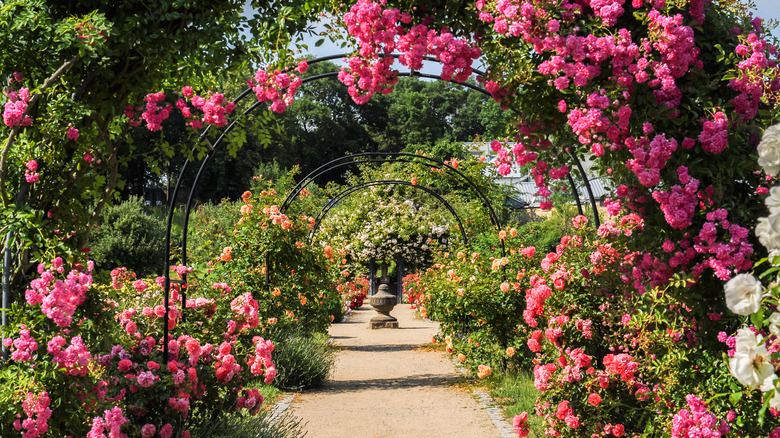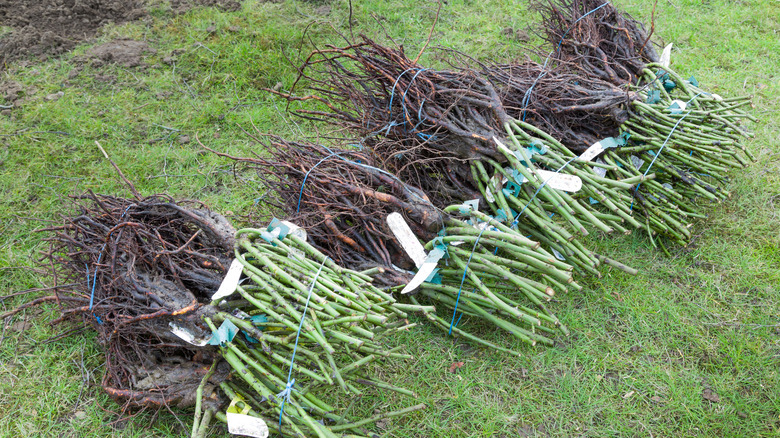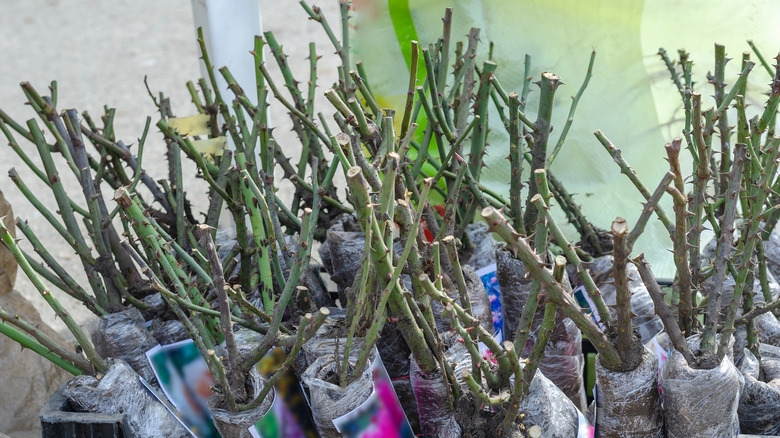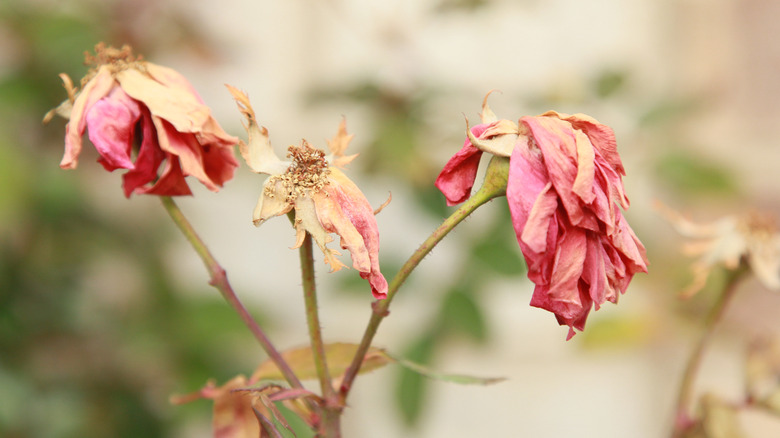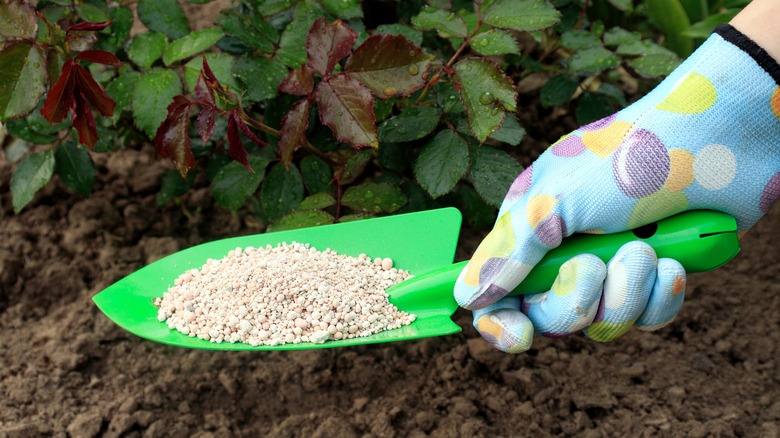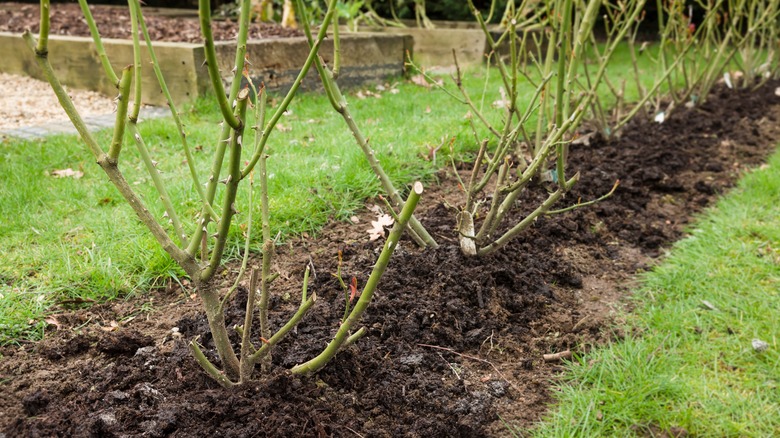5 Pointers For Planting Rose Bushes In Your Garden This Autumn
Rose bushes are beautiful plants to grow in your garden. Providing them with proper care isn't hard, especially if you set up systems like drip irrigation. These plants require loose soil with good drainage, but it's best to keep the dirt moist. To do this, you may need to water them daily.
If you'll be watering the plants with a hose, set it to shower mode. Pouring too much water at once onto your flowers can cause powdery mildew (per Lomi). The best spot in your yard for this plant is a place with good air circulation and sun. However, long periods of direct sunlight will be detrimental if your climate is too warm. Roses prefer a spot where the sun will shine in the morning and subside later in the day.
The time of year you choose to plant your rose bush will affect its health. You have two choices: spring or fall. Fall is often favored because it will give your plant more time to grow and establish itself before experiencing extreme elements. To find the perfect time to plant your rose bushes, look up when the last frost is expected. You can do your planting six weeks before that date.
Check how they were grown
Roses are available for purchase in three different versions of packaging. You can buy bare-root, containerized, and container-grown plants. The difference is that the first two are grown in the earth and dug up before being shipped to your local stores. However, one is kept with exposed roots, and the other is potted. Meanwhile, container-grown roses live in plastic nursery pots until you remove them. Generally, bare-root is the best choice because it allows the plant to spread out easier.
On the other hand, container-grown roses are the best option if you want to plant them during autumn since they have a more developed root system, according to Thompson and Morgan. These are less likely to experience transplant shock and can be added to your garden at any time of the year because they are more mature from living in a pot. If you opt for bare-root varieties, they will likely die before the end of winter.
Only plant dormant rose bushes
Besides determining how your plant was grown, you must ensure it is dormant before planting it in your garden during fall. Most rose bushes go dormant in the winter to conserve energy in order to survive the cold. That's why you don't see any active growth or new flowers in the snow. You'll know that your plant is dormant if you don't see fresh blooms, leaves, or long stems.
You don't want to sow an active rose bush during autumn because it will disrupt the plant's regular growth pattern, according to Thriving Yard. Normally, rose bushes grow from early spring to late summer. However, if it isn't dormant and is transplanted, it will want to keep growing through fall and winter to establish a mature root system in its new environment. When a rose bush is active during these cold months, there won't be enough water, sunlight, or nutrients to support new growth. Then it will die before spring.
Don't prune the rose bushes
Pruning is usually a good idea. It will promote new growth while removing any diseased or dead portions of a plant. However, this will do more harm than good to a freshly transplanted rose bush. When any vegetation is planted, it has a risk of developing transplant shock. Miracle-Gro recommends not pruning rose bushes between late summer and early winter because they are dormant.
If you were to trim off potions of your rose bush while planting it this autumn, you would add more trauma to an already stressful situation. Transplant shock occurs when a newly planted rose bush begins dying instead of developing a root system. According to Thriving Yard, signs to look out for are lost leaves and wilting brown or yellow leaves. On top of moving your plant and possibly removing some roots in the process, pruning it will give it open wounds that need to heal. It's best to wait until springtime before trimming your rose bush.
Don't overfertilize them
Fertilizing a newly planted rose bush may seem like a good idea so that it can have the nutrients it needs to grow. However, this isn't good when you're planting them in autumn. A fertilizer's purpose is to provide your garden with the nitrogen, phosphorus, and potassium needed to create new growth and bloom flowers. This process should happen in the summer when plenty of sunlight and water are available to sustain your plants. Giving them fertilizer in autumn can bring your rose bush out of dormancy and cause it to die before next spring, according to Old World Garden Farms.
The purpose of planting in autumn is that it will give your rose bush just enough time to establish its root system before winter begins. Then it can receive fertilizer during spring and is prepared to start growing flowers. Prematurely feeding them will make them more susceptible to the cold temperature freezing and killing their tender foliage. Instead of preserving resources, your plant will focus on creating new growth that's destined to die.
Use plenty of mulch
Mulch is a valuable tool for planting rose bushes before a cold winter. It creates a protective layer over the bottom of the rose bush and its roots. However, knowing how to best mulch your garden during fall is important. Adding plenty of mulch will help your plant in a handful of different ways. One essential way is by keeping the ground around it warmer for longer. This will allow your rose bush to develop a mature root system before the season's first frost. Another reason to add mulch is that it will help the soil retain moisture, so you don't have to water your bushes as frequently.
David Austin explains that mulch will even provide nutrients depending on the type you choose. Of course, you won't want to use a nutrient-dense choice like compost since you planted a dormant rose bush. Instead, you can use composted straw or bark. Then you can use garden compost or rotted manure for your plants from February to April. To do this, apply the mulch from the base of your plant to the end of the rose canopy. It should be about 1 to 2 inches thick.
